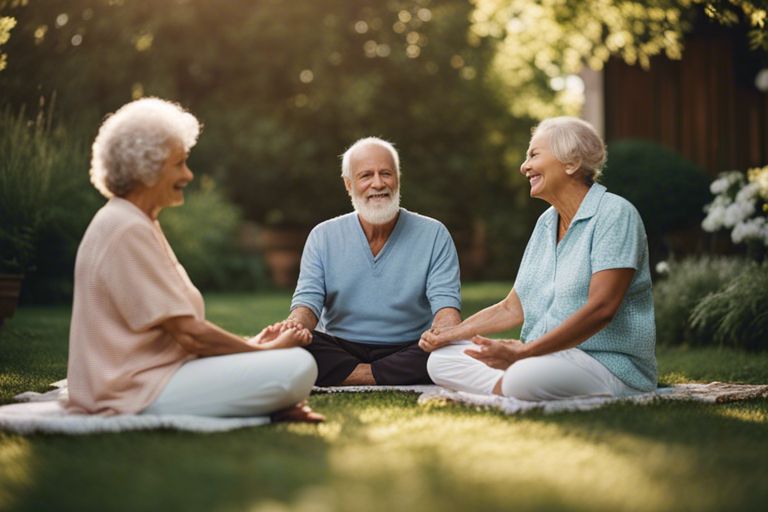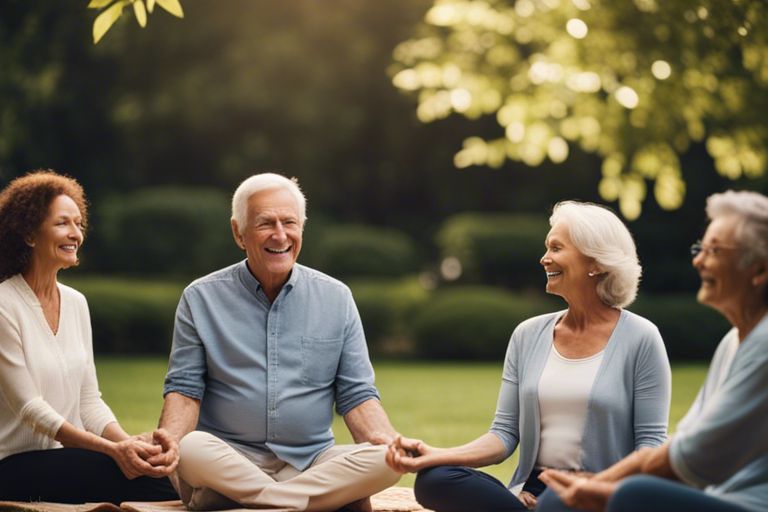Mindfulness is key to maintaining a healthy and active lifestyle in senior years. In this article, we will explore various mindfulness practices that can help seniors stay active and healthy as they age. From gentle yoga poses to meditation techniques, incorporating these practices into daily routines can improve overall well-being and enhance the quality of life for older adults. Let’s dive in and discover the benefits of mindfulness for seniors!
Key Takeaways:
- Mindfulness practices can help seniors stay active and healthy by focusing on the present moment and reducing stress.
- Engaging in gentle exercises such as yoga or taichi can improve balance, flexibility, and overall well-being for seniors.
- Practicing deep breathing exercises can help seniors relax their minds and bodies, promoting calmness and reducing anxiety.
- Regular walking or meditation sessions can enhance seniors’ mental clarity and cognitive function.
- Establishing a daily routine that includes mindfulness practices can contribute to a senior’s overall wellness and quality of life.
Benefits of Mindfulness for Seniors
A lot of research has shown that mindfulness practices can have numerous benefits for seniors. These practices can help improve both physical and mental well-being, making them an excellent addition to the daily routine of older adults.
Reduces Stress and Anxiety
With regular practice of mindfulness techniques such as deep breathing, meditation, and gentle movements like yoga or tai chi, seniors can experience a significant reduction in stress and anxiety levels. These practices help calm the mind, reduce the production of stress hormones, and promote a sense of relaxation and inner peace.
Improves Sleep Quality
On top of reducing stress and anxiety, mindfulness practices have been shown to improve sleep quality in seniors. By incorporating mindfulness techniques into their bedtime routine, such as guided meditation or body scan exercises, seniors can experience better sleep patterns and a more restful night’s sleep.
Plus, improved sleep quality is linked to better overall health and well-being, including a boost in immune function and cognitive performance. Seniors who practice mindfulness regularly may find themselves feeling more energized and alert during the day.
Enhances Cognitive Function
Mindfulness practices can also enhance cognitive function in seniors. By fostering greater attention, memory, and mental clarity, these practices can help older adults maintain cognitive abilities and potentially reduce the risk of age-related cognitive decline.
Enhances In addition to cognitive benefits, mindfulness practices can also improve emotional regulation and resilience, enabling seniors to better cope with the stresses and challenges of aging.

Simple Mindfulness Exercises for Seniors
Now, let’s explore some simple mindfulness exercises that can help seniors stay active and healthy. These practices can improve overall well-being and bring a sense of calm and peace to daily life.
Deep Breathing Techniques
Breathing exercises are a fundamental part of mindfulness practice. Deep breathing can help seniors reduce stress, improve oxygen flow, and promote relaxation. Find a comfortable seated position, close your eyes, and take a slow, deep breath in through your nose, expanding your belly. Hold for a moment, then slowly exhale through your mouth. Repeat this several times, focusing on the sensation of your breath.
Body Scan Meditation
On the other hand, body scan meditation is another valuable mindfulness exercise for seniors. This practice involves gradually moving your awareness through different parts of your body, noticing any tension or sensations. Start by lying down or sitting comfortably, then close your eyes and bring your attention to your toes. Slowly work your way up through your legs, torso, arms, and head, releasing any areas of tightness as you go.
To explore deeper into body scan meditation, pay attention to each body part individually, sending relaxation and warmth to areas that may be holding tension. This exercise can help seniors cultivate a greater sense of body awareness and relaxation, promoting better sleep and overall well-being.
Mindful Walking
To engage in mindful walking, seniors can take a leisurely stroll in a peaceful environment, focusing intently on each step and the sensations in their feet. The practice of mindful walking can enhance balance, coordination, and presence in the moment. Notice the feeling of the ground beneath your feet, the rhythm of your steps, and the sights and sounds around you. This can be a refreshing way to connect with nature and the present moment.
The act of mindful walking can also be a form of moving meditation, allowing seniors to center themselves and find peace in the midst of daily activities. By incorporating mindfulness into their walks, seniors can improve not only physical health but also mental clarity and emotional well-being.
Mindfulness and Physical Activity
For seniors looking to stay active and healthy, incorporating mindfulness practices into physical activity routines can have numerous benefits. Mindfulness techniques not only help to improve mental well-being but also enhance physical health by promoting balance, flexibility, and strength.
Tai Chi for Balance and Flexibility
Balance is crucial for seniors to prevent falls and maintain independence. Tai Chi, a gentle form of martial arts, focuses on slow, deliberate movements that help improve balance and flexibility. Regular practice of Tai Chi has been shown to reduce the risk of falls and improve overall stability, making it an excellent choice for seniors looking to enhance their physical well-being.
Yoga for Strength and Flexibility
One of the most popular forms of mind-body exercise, yoga is a great option for seniors looking to improve strength and flexibility. With a variety of poses and modifications available, yoga can be easily adapted to suit individual needs and abilities. Practicing yoga regularly can help build muscle strength, enhance flexibility, and improve overall posture, making it an ideal choice for seniors wanting to stay active and healthy.
To get started with yoga, seniors can explore gentle Hatha or chair yoga classes specifically designed for older adults. These classes focus on safe and effective movements that help improve strength, flexibility, and balance, all while promoting relaxation and mindfulness.
Mindful Movement for Chronic Conditions
Physical activity is necessary for managing chronic conditions such as arthritis, osteoporosis, and heart disease. Mindful movement practices, such as gentle stretching exercises and low-impact aerobics, can help seniors with chronic conditions improve flexibility, reduce pain, and enhance overall well-being. By incorporating mindfulness into movement routines, seniors can better connect with their bodies, reduce stress, and improve their quality of life.
Strength training exercises, such as lifting light weights or using resistance bands, can also be beneficial for seniors with chronic conditions. These exercises help build muscle mass, increase bone density, and improve joint stability, ultimately leading to better physical function and overall health.
Mindfulness for Emotional Well-being
Unlike physical activities focusing on the body, mindfulness practices can greatly benefit emotional well-being in seniors. These practices help individuals stay present in the moment, cultivate gratitude, manage grief and loss, build resilience, and promote positivity in daily life.
Cultivating Gratitude and Positivity
The practice of gratitude involves acknowledging and appreciating the good things in life, no matter how small they may seem. Research shows that regularly expressing gratitude can lead to improved overall well-being, including increased happiness, better sleep, and reduced stress levels. Seniors can start a gratitude journal, write thank you notes, or simply take a moment each day to reflect on what they are grateful for.
Managing Grief and Loss
One of the challenges of aging is facing the loss of loved ones, independence, or health. It’s vital for seniors to acknowledge and process their feelings of grief in a healthy way. Seeking support from friends, family, or a therapist can help navigate the complex emotions that come with loss. Engaging in mindfulness practices like meditation or yoga can also provide a sense of calm and acceptance during difficult times.
One of the key aspects of managing grief and loss is allowing oneself to feel the emotions fully. Suppressing feelings of grief can lead to prolonged suffering and may negatively impact mental and physical health. By practicing mindfulness, seniors can learn to observe their emotions without judgment and eventually find peace and acceptance.
Building Resilience and Confidence
Mindfulness practices can help seniors build resilience by teaching them to adapt to life’s challenges with a positive outlook. By focusing on the present moment and accepting things as they are, individuals can develop a sense of inner strength and confidence. Mindfulness meditation, deep breathing exercises, and guided imagery are effective tools for cultivating resilience in seniors.
Positivity is a key component of building resilience in seniors. Having a positive mindset can help older adults navigate through difficult situations with grace and optimism. By incorporating mindfulness practices into their daily routine, seniors can develop a more positive outlook on life and approach aging with resilience and confidence.
Mindfulness in Daily Life
Keep your mind sharp and your body healthy by incorporating mindfulness practices into your daily routine. From mindful eating to mindful leisure activities, there are numerous ways to enhance your overall well-being and promote a sense of calm and relaxation.
Mindful Eating for Healthy Nutrition
Life is all about balance, and this rings especially true when it comes to nutrition. By practicing mindful eating, seniors can savor each bite, pay attention to hunger cues, and make healthier food choices. Focus on incorporating colorful fruits and vegetables, whole grains, lean proteins, and healthy fats into your meals to nourish your body and mind.
Mindful Communication for Better Relationships
Mindful communication involves listening attentively, speaking thoughtfully, and being present in your interactions with others. By cultivating empathy, understanding, and patience in your conversations, you can strengthen your relationships with loved ones and foster a greater sense of connection.
Understanding the power of nonverbal cues and active listening can significantly improve the quality of your relationships and help you navigate conflicts with grace and compassion.
Mindful Leisure Activities for Joy and Fulfillment
Any activity can be an opportunity for mindfulness and relaxation. Whether you enjoy gardening, painting, puzzles, or simply taking a leisurely walk in nature, engaging in activities that bring you joy can enhance your mood and overall well-being.
Relationships can also benefit from mindful leisure activities, as they provide opportunities to connect with others in a meaningful way and create lasting memories together.

Overcoming Challenges to Mindfulness Practice
Dealing with Physical Limitations
Not everyone has the same physical abilities, and it’s imperative to approach mindfulness practice with compassion and an understanding of your own limitations. If sitting cross-legged on the floor is uncomfortable, try sitting in a chair with your feet planted firmly on the ground. Gentle yoga stretches or even just focusing on your breath while lying down can also be effective ways to practice mindfulness without straining your body.
Managing Distractions and Interruptions
Interruptions are a common part of life, especially for seniors who may have grandchildren running around or a busy household. However, you can still cultivate mindfulness by acknowledging these distractions without judgment and gently guiding your focus back to the present moment. Creating a designated quiet space or time for mindfulness practice can help minimize interruptions and allow you to fully engage in the practice.
Mindfulness is not about eliminating distractions but rather about acknowledging them and then refocusing your attention. It’s natural for the mind to wander, so be gentle with yourself and practice patience as you work on staying present.
Staying Motivated and Consistent
Consistent mindfulness practice is key to reaping its benefits, but staying motivated can be challenging, especially for seniors who may face health issues or other concerns. To stay motivated, try setting realistic goals and creating a routine that works for you. Pairing mindfulness practice with an activity you enjoy, such as gardening or listening to music, can also help make it a more enjoyable experience.
Overcoming obstacles to mindfulness practice requires dedication and a willingness to adapt to the changes that come with age. By approaching challenges with compassion, managing distractions with patience, and staying motivated and consistent in their practice, seniors can enhance their overall well-being and lead a more fulfilling life.
To wrap up
Conclusively, integrating mindfulness practices into daily routines can significantly benefit seniors in staying active and healthy. The exercises mentioned in the article, such as deep breathing, mindful walking, and gratitude journaling, can help improve physical well-being and cognitive function while reducing stress and anxiety. By incorporating these simple mindfulness techniques, seniors can enhance their overall quality of life and find joy in the present moment. For more mindfulness exercises tailored specifically for seniors, check out 5 Mindfulness Exercises for Seniors.
FAQ
Q: What are mindfulness practices for seniors?
A: Mindfulness practices for seniors are techniques that help them stay present and focused, reduce stress, and improve overall well-being. These can include meditation, deep breathing exercises, gentle yoga, and activities that promote relaxation and self-awareness.
Q: How can mindfulness practices help seniors stay active and healthy?
A: Mindfulness practices can help seniors stay active and healthy by reducing anxiety and depression, improving sleep quality, enhancing cognitive function, and boosting immunity. These practices can also increase overall physical activity levels and promote better emotional and mental well-being.
Q: What are some simple mindfulness practices that seniors can incorporate into their daily routine?
A: Seniors can incorporate mindfulness practices into their daily routine by starting with short meditation sessions, practicing deep breathing exercises throughout the day, taking mindful walks in nature, engaging in creative activities like painting or gardening, and attending gentle yoga or tai chi classes. It’s crucial to find activities that resonate with them and bring a sense of peace and relaxation.
Stay tuned for more insights and tips on navigating visit our homepage for more articles.
